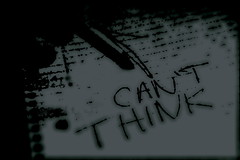But first, the winner of The Emotion Thesaurus eBook is . . .
Thanks to everyone who entered!
So I mentioned that my youngest sister got married last month. My parents (really my mom) benefited from their expertise from hosting my and my other two sisters’ weddings (and a five-year break since the last one), and the whole thing was wonderful.

See? We loved it. I’m the one on the left, enjoying the drollery with my sister Brooke.
After the beautiful ceremony and luncheon, my family regrouped at my parents’ house before heading out to the reception. I happened to be driving the first carload to return home and I found two packages waiting. One of them was addressed to my new brother-in-law’s older sister, Ellen—kind of weird, considering we’d never met her before that week.
Thinking it was a gift she was sending to the newlyweds, I brought the package inside until they got there. After a while, they arrived and I handed the package over.
Inside were three copies of this:
It was my new brother-in-law’s older sister’s YA novel, The Isolated (by Ellen Stokes, if you’re getting tired of the long relationship story). We thumbed through the copies. Somehow, despite seeing the word “PROOF” stamped in the interior pages, we figured they must be gifts for the newlyweds. Still.
Mmkay. (We’re slow. I was also under the influence of the plague*.)
We finally trek over to the reception venue, and word gets ’round to Ellen that her books had arrived. For some strange reason, she really wanted to, you know, see her proof copies.
All of them.
Oh, right. Because she knew she’d be there for a few days before the wedding, she had her proofs shipped to my parents’ house.
Where the books still were.
Um, duh. So after the reception, she headed back to my parents’ house and I got her proof copies, since she was hitting the road early the next morning.
Would’ve gone off without a hitch entirely if my newlywed sister hadn’t later asked, “Oh, where are the books Ellen sent us?”
*facepalm*
More about the book!
It’s been seventeen years and Gray has never tasted salt. She’s never tasted sugar. She’s never heard the swelling voices of a crowd or felt the heat of bodies in a packed room. She’s been banished from society since birth and merely waits to die in Griseus, the endless moor of dead grass and wind to which her murderous uncle exiled her.
But all that is about to change when Gray is unexpectedly ripped from solitude and into the world she never knew: a world that is filled with bustling alleyways, towering citadels, glorious new tastes, and a task so dark it nearly swallows her up.
For the first time in her life she is needed, and it’s vital she comply. Knowing nothing of the world, Gray would latch first onto another human soul that can guide her—any other soul. Even if that soul were her captor.
Set in a place unlike any other, THE ISOLATED asks its readers which is worse: the captivity of the mind, the body, or the soul?
What do you think? Did you ever have one of those embarrassing moments with another author?
* Not an actual plague.





 sometimes, you just don’t know what comes next and all your ideas are vague, lame, or just not the very next thing in your story.
sometimes, you just don’t know what comes next and all your ideas are vague, lame, or just not the very next thing in your story.





